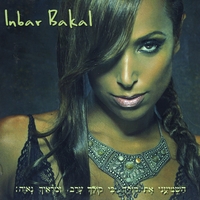Podcast: Play in new window | Download
Subscribe: RSS
An Israeli singer turns Hebrew text into sensual electronica on Echoes.
You can hear an audio version of this blog with Inbar Bakal’s music here.
 Israeli vocalist Inbar Bakal thought she’d become a pop singer and in 2003 she moved to Los Angeles with that goal in mind.
Israeli vocalist Inbar Bakal thought she’d become a pop singer and in 2003 she moved to Los Angeles with that goal in mind.
Inbar Bakal: I was trying the stuff that was more – what’s the word? – more pop? More pop, more Western and I was thinking of singing in English. I was worried that Hebrew and Yemenite might scare people away.
But a meeting with Carmen Rizzo changed her direction. He’s produced, mixed and played for artists like Seal and Alanis Morrisette, recorded his own CDs and of most relevance to this project, he was the electronic side of the Persian fusion group, Niyaz. He wasn’t hearing straight pop music for Inbar Bakal.
Carmen Rizzo: You know, she was so interesting when I met her. Her physical look was so amazingly beautiful and interesting. But nothing in the music represented what it was like when you met her. And I said, “Why don’t you sing in Hebrew or some of these other languages.”
Their first song together was “The Bride,” merging two Yemenite folk melodies. Inbar draws her lyrics from the Bible, but it’s not a religious album. She turns prayers into sensuous entreaties to a lover.
Inbar Bakal: I remember just being so hypnotized reading the text and wondering, “Why is it in the Bible it talks about women’s breasts and touching?” It was a sensual and erotic description. And I was very young and I remember thinking, that would be cool if I could sing it one day.
Despite the contemporary production executed by Carmen Rizzo, Inbar Bakal’s songs are mostly based in Yemenite folk music.
Inbar Bakal: I think there is something really magical in the old folk songs combined with this new production, new sound. That hybrid just creates something really beautiful. And, even if you don’t understand the language, I think it’s more easy to digest.
Inbar Bakal’s new EP is called Song of Songs on Electrophone Records. I’ll have a full interview with her on Monday’s Echoes. This has been an Echo Location.
John Diliberto ((( echoes )))

I like her singing; the production is just a bit too contemporary; too “produced” I would like to hear a similar album with traditional instrumentation …
Well, there’s a lot of traditional oud, bouzouki, saz, tabla and dumbek. I think the contemporary sound was the goal of the project, but I can see how it might not be to everyone’s taste.